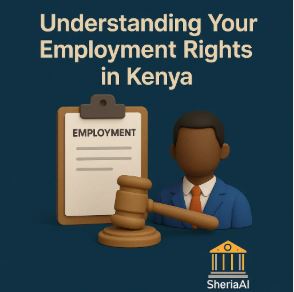The workplace is governed by a complex framework of legal obligations and rights in Kenya. Whether you are an employer seeking compliance or an employee in need of protection, understanding the employment laws of Kenya is crucial. Below is a brief yet comprehensive overview of key employment legislation in Kenya and their relevance to workplace relationships.
- The Constitution of Kenya (2010)
What it covers:
As the supreme law of Kenya, the Constitution lays the foundation for all employment rights and freedoms for the workers in Kenya.
Why it matters:
- The constitution guarantees the right to fair employment practices for all workers in Kenya.
- It prohibits discrimination of any person on grounds such as race, sex, or disability amongst others.
- It ensures fair remuneration and the human working conditions for all workers.
- The Employment Act, 2007
What It Covers:
The Employment Act, 2007 is Kenya’s principal employment legislation, governing the terms of employment, employee rights, and employer responsibilities.
Why It Matters:
- It regulates employment contracts, wages, working hours, and leave entitlements for employees.
- It provides safeguards against unfair terminations in workplaces.
- It outlines dispute resolution procedures.
- The Labour Relations Act, 2007
What It Covers:
This Act governs trade unions, collective bargaining, and industrial action by workers.
Why It Matters:
- It empowers workers to unionize and bargain collectively.
- It sets out procedures for lawful strikes and lockouts by workers.
- It promotes peaceful dispute resolution mechanisms in instances of disputes.
- The Labour Institutions Act, 2007
What It Covers:
this Act establishes key institutions for labour management, including the National Labour Board and the Employment and Labour Relations Court.
Why It Matters:
- It supports enforcement of labour laws and standards in Kenya.
- It facilitates the regulation of wages and employment agencies.
- It enhances institutional support for workplace fairness.
- The Occupational Safety and Health Act (OSHA), 2007
What It Covers:
OSHA ensures safety, health, and welfare of workers in all workplaces within Kenya.
Why It Matters:
- It requires employers to provide a safe working environment for employees.
- It mandates safety audits, risk assessments, and employee training.
- The Work Injury Benefits Act (WIBA), 2007
What It Covers:
WIBA Provides compensation for employees injured on the job or who suffer from occupational diseases.
Why It Matters:
- It guarantees financial protection for work-related injuries suffered by employees in line of duty.
- It requires employers to have insurance for such liabilities.
- Ensures faster and fair compensation processes incase of injuries suffered by employees.
- The National Social Security Fund (NSSF) Act, 2013
What It Covers:
Outlines the mandatory social security contributions for retirement benefits.
Why It Matters:
- Safeguards employees’ retirement through employer/employee contributions.
- Offers long-term security and benefits after employment ends.
- Promotes financial responsibility among employers.
- The Persons with Disabilities Act, 2025
What It Covers:
Protects the rights of persons with disabilities in employment and public life.
Why It Matters:
- Prohibits workplace discrimination on the basis of disability
- Requires reasonable accommodations in the workplace
- Promotes inclusion and diversity in employment
- The Children Act (Revised), 2022
What It Covers:
Protects children from economic exploitation and child labour.
Why It Matters:
- Sets minimum age for employment
- Outlaws hazardous and exploitative child labour
- Promotes ethical hiring and corporate social responsibility
Why Understanding Employment Law in Kenya Is Important
Whether you are drafting contracts, handling employee disputes, or navigating redundancy and termination procedures, compliance with Kenyan employment law is essential. Not only does it shield your organization/company from legal risks, but it also fosters a fair, safe, and productive work environment.
Disclaimer: This article is for informational purposes only and does not constitute legal advice. You should consult with a qualified legal professional for advice on your specific situation.

